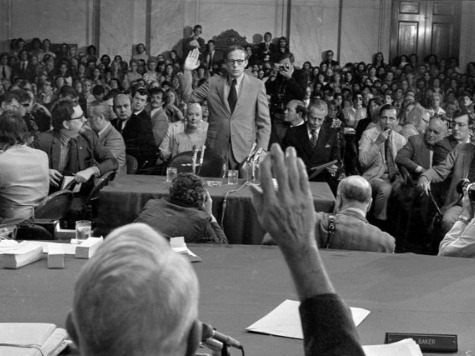In the days leading up to the anniversary of President Nixon’s resignation, it may be of interest to recall what happened to John Dean, his principal accuser.
Dean had been counsel to the President and had acted as chief desk officer for the Watergate cover-up, during which he committed any number of criminal acts. When it collapsed, Dean was the first to seek out government prosecutors and to offer to testify against his former colleagues.
He was sentenced to a prison term of 1-4 years by Judge Sirica on August 2, 1974, just days before Nixon’s own resignation, as the Watergate scandal wound toward its conclusion.
What is so fascinating is that Dean never spent a single day in jail. His purported sentence was imposed solely to enhance his credibility as the government’s witness in the cover-up trial.
It was an intentional fraud on the jury – and on the American people.
Dean pleaded guilty to a single felony on October 19, 1973, as a part of a plea bargain with prosecutors. His sentencing was postponed until after the trial where he would appear as the government’s lead witness, which is standard practice in government prosecutions.
But when John Mitchell and Maurice Stans were acquitted in the Vesco trial in New York City, and jurors told the media that they did not find Dean’s testimony to be credible, Judge Sirica decided a harsh sentence was necessary to increase Dean’s credibility in the upcoming cover-up trial. The 1-4 year sentence was the toughest handed down to any Watergate defendant at that time. Sirica also decreed that Dean’s incarceration would coincide with the beginning of the trial itself.
Dean was the government’s lead off witness. Supposedly testifying from prison, the prosecutors made clear to the jurors that Dean had already been punished for his own misdeeds – and so, by implication, should his former colleagues against whom he was testifying.
Sirica later admitted in his own book that Dean’s sentencing was only to increase his credibility: “As long as he appeared to testify fully and truthfully, I knew that what he said on the witness stand was not going to make any difference in the sentence I handed down.” Admitting that he had sentenced him before trial to show that he was being appropriately punished, Sirica also expressly prevented defense counsel from making any suggestion to the jurors that Dean’s testimony was motivated by a hope for leniency in his own case. He’s already been sentenced, thundered Sirica in a private bench conference, you cannot pursue this line of questioning.
The special prosecutors fully concurred in Sirica’s approach, agreeing that “Dean would not be an effective witness at trial if he got a free ride”. As they saw it, Dean’s harsh sentencing was the key to his credibility: “As a man who was already serving a long jail term, . . . Dean made a measurably greater impression than if he had never been charged or punished for his acts.”
Their sentencing ploy clearly worked: After a three month trial, Bob Haldeman, John Ehrlichman and John Mitchell were found guilty on all counts – and each was sentenced by Sirica to a prison term of 2½ to 8 years.
Yet, only a week after the trial, and on his own motion, Judge Sirica reduced Dean’s sentence to time served – setting him completely free after only four months of supposed incarceration – the least of any major Watergate defendant.
Perhaps even more astonishing is the fact that Dean never saw the inside of a jail cell, let alone spent time in an actual prison. Instead, he was confined to a witness holding facility at Fort Holabird, Maryland.
At least, that’s where he spent his nights. Each day, he was driven by Federal marshals to the Special Prosecutor’s offices on K Street in Washington, DC, where he worked on his forthcoming book.
In a 2012 interview at Chapman University, Dean bragged about this lenient treatment, assuring his interviewer that he had been staying in a safe house: “Every day of the four months I was in confinement I was driven into Washington to the prosecutor’s office.” “Not exactly hard time,” is how Dean recalled his supposed confinement.
The Dean sentencing ploy was a fraud — and a flagrant abuse of the due process of law guaranteed to criminal defendants by our Bill of Rights. While done by a judge and prosecutors intent on securing Watergate convictions no matter what it took, it is but one of many judicial and prosecutorial abuses in Watergate that have never been exposed to the American public. Fortunately, this is a situation about to change.
Geoff Shepard was a young lawyer on President Nixon’s Watergate defense team. His new book, The Real Watergate Scandal: Collusion, Corruption and the Plot that Brought Nixon Down, is being published this month by Regnery. Learn more at www.geoffshepard.com.

COMMENTS
Please let us know if you're having issues with commenting.